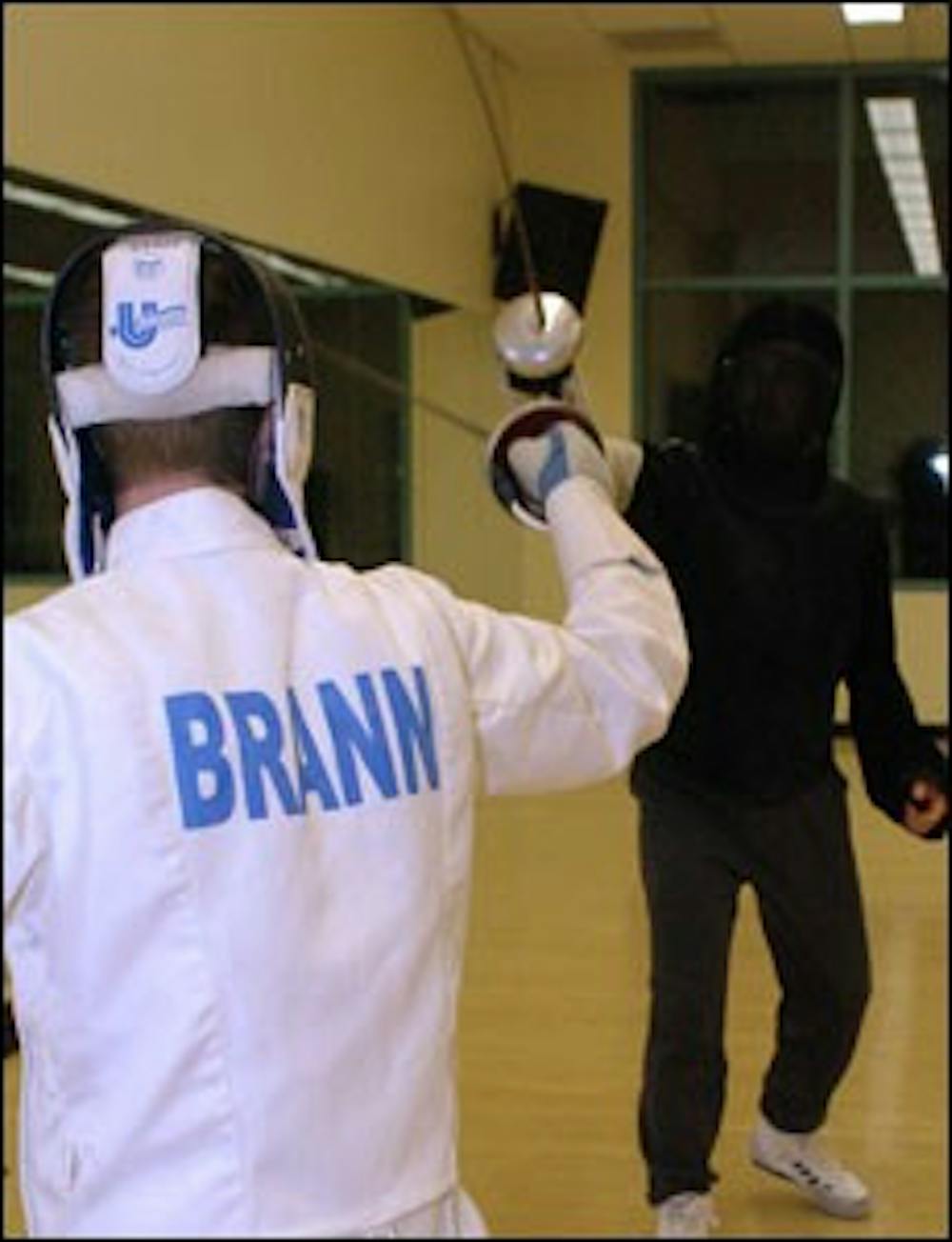When Mariel Zagunis won the women's sabre fencing gold medal at the 2004 Summer Olympics in Athens, Greece, few people outside the fencing community seemed to notice.
But her performance, which gave the United States its first medal in the sport in 20 years, has helped rejuvenate one of ASU's oldest sports clubs, Salle Diablo, the fencing club at ASU.
"The whole aftermath of the 2004 gold medal has been good for fencing all over the place," said head coach Jim Barbour, who has guided the club since 1991.
That medal was especially good for fencing at ASU. The club struggled with membership throughout the past few years, but it has seen an increase in its numbers and participation this semester. It currently has 20 active members.
Senior Elizabeth Dreeland, who has been with the club since her freshman year, agreed that the medal increased membership.
"There's been a real increase in interest since the Olympics," she said. "It will take time to grow, but if we get enough support I think we have a lot of potential."
There are three different weapons in fencing: foil, epee and sabre. Each weapon has different rules, but all three use an electonic points system based on the pressure applied to the weapon.
In foil, the tip of the blade must strike somewhere on the torso to score a point. In epee, the entire body is a valid target, while the scoring area with the sabre lies in between the hips and the top of the head.
Most fencers focus on one weapon, but some try all three.
Barbour said the club was trying to expand its repoitoire by teaching all three weapons.
"We just started getting epeeists this semester," he said. "We're trying to build up all the events."
The fencing club is not new to ASU. A version of it existed on campus during the '50s and '60s. The current club began in 1976. Its members practice Tuesdays and Thursdays from 8 to 11 p.m. in Small Gym C of the Student Recreation Complex. They also meet at the same location on Saturdays at 2:30 p.m.
The increase in interest from the Olympics isn't the only thing going well for the club this season. The club also got new uniforms and more advanced, updated electronic scoring machines to help improve its play.
Club President John Harvell said the new equipment has helped the club members take their play to a higher level, but that the keys to success in the sport were determination and dedication.
"Fencing requires a lot of perseverance, hard work and willingness to learn," he said. "We want to improve everyone's technique through coaching and our bouts. We want to become a stronger club."
To gain more experience and become a stronger club, members of Salle Diablo spent their weekends this semester participating in various tournaments throughout the Southwest.
Dreeland, in fact, participated in four tournaments in California during four different weekends.
On Sept. 12 she fenced in San Diego. On Oct. 9-10 she fenced in Long Beach, Calif., and the following weekend she competed in San Bernadino, Calif. She then fenced in Los Angeles on Nov. 14.
Dreeland said all the time traveling was well spent, even though it was not easy.
"It was very rewarding," she said. "For all the frustration, pain, and driving -- the times you are in the zone, even though it might only be for 30 seconds -- makes it all worth it."
But, even with all of the competitions in California, Dreeland said her finest moment of the semester came in a different state. During the New Mexico Open on Oct. 23-24, she placed second in the women's foil event.
"That's the highest any of us has done in an out-of-state tournament," she said.
Dreeland wasn't the only club member accomplishing great things this semester. Several other members had solid performances at other tournaments. The club's best overall performance, however, happened right here at ASU.
On Nov. 21, Salle Diablo ended its competitive season for the semester participating in the ASU Open Tournament. The results of the tournament marked solid progress for the team.
Three club members: Cameron Perry, Bryant Haynes and Mark Soria took the top three places in the foil competition, while Shannon Young took first in the epee event.
Salle Diablo is one of 10 fencing clubs in the state and the only fencing club at the three major universities. Because of limited resources in the past, the club had to charge for lessons. This semester, however, lessons were provided free of charge.
The club isn't all about competition, even though its members participated in several tournaments throughout the semester. Dreeland said the members also wanted to help get rid of the sterotypes that surrounded the sport.
"It's seen as such an elite sport, but it doesn't have to be," she said. "It's extremely individual and it's very intellectual. There's a lot of strategy and thinking that goes into it. It requires an aggressive intelligence."
Reach the reporter at jeremy.a.cluff@asu.edu.




